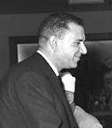Loading AI tools
Egyptian politician and minister (1929–2020) From Wikipedia, the free encyclopedia
Shams Al Din Badran (Arabic: شمس الدين بدران; 19 April 1929 – 28 November 2020) was an Egyptian government official. He served as minister of war of Egypt during Gamal Abdel Nasser's era and the Six-Day War of 1967. He was removed from his post during the war and later imprisoned. After his release he married a British woman and lived in "self-imposed exile" in the United Kingdom.
Shams Badran | |
|---|---|
 | |
| Minister of War | |
| In office 10 September 1966 – 10 June 1967 | |
| President | Gamal Abdel Nasser |
| Preceded by | Abdel Wahab Al Bishri |
| Succeeded by |
|
| Personal details | |
| Born | 19 April 1929 Giza, Kingdom of Egypt |
| Died | 28 November 2020 (aged 91) Plymouth, United Kingdom |
| Alma mater | Military academy |
Badran was born on 19 April 1929.[1][2] After high school, he attended a military academy and graduated in 1948 as a junior officer[1] and almost immediately dispatched to the 1947–1949 Palestine war, where he was besieged by Zionist militias along with Gamal Abdel Nasser in Al-Faluja, for which he earned a Gold Medal of Merit from Farouk of Egypt.[2] Badran was later sent to France for a one-year training on a military scholarship.[2]
Badran was the head of Egypt's military security services in the mid-1960s.[3] He also served as the office manager of Field Marshal Abdul Hakim Amer under Gamal Abdel Nasser's presidency.[4] Badran was one of the top aides of Amer.[5] The Muslim Brotherhood accused him and Amer of responsibility for the torture of Brotherhood leaders who had been arrested due to their alleged plans to assassinate Nasser in 1965.[6][7]
Badran was appointed minister of war on 10 September 1966, a few months before the Six-Day War in June 1967, replacing Abdel Wahab Al Bishri in the post.[1][8] Amer had supported Badran's appointment.[9] Badran was also named as the chief of Nasser's cabinet the same year.[10] Badran met with the Fatah members in the late 1966.[11] They asked to create a Fatah base in the Negev desert which would be backed by the Egypt's logistical help to attack the Israeli army.[11] However, Badran did not take their plan seriously.[11] On 25 May 1967, Badran visited Moscow and met senior Soviet officials, including Prime Minister Alexei Kosygin, to secure their support regarding a perceived Israeli threat.[5] Badran resigned from office on 10 June 1967, during the Six-Day War, and was replaced by Abdel Wahab Al Bishri, interim minister of war.[8][12] Amin Howeidi was named as the minister of war on 22 July 1967.[8]
Following the defeat of the Egypt in the Six-Day War Badran was considered as a successor to the President Gamal Abdel Nasser.[13]
Badran along with other senior officials, including Amer, was detained on 25 August 1967 on charges of plotting against Nasser.[14][15] However, they were tried for their roles during the six day war in 1967, including for Badran charges of torturing members of the Muslim Brotherhood.[16][17] Badran appeared in court in two separate trials.[16] He and Salah Nasr, former chief of intelligence and also part of Amer's faction, were convicted and sentenced to hard labour due to their roles in the defeat.[18]
Following his release from prison by president Anwar Sadat on 23 May 1974, Badran left Egypt and went to live in London.[19] Badran published part of his memoirs in the Kuwaiti newspaper Al-Siyasa in 2014.[17] Badran's reports included information about the personal life of Gamal Abdel Nasser which were disputed by Sami Sharaf, a Nasser era official.[20]
Badran married his first wife, Muna Rushdie, on 7 June 1962. The couple had one daughter named Hiba; they divorced in January 1989 by a court decision, as he had been absent for three years. Rushdie worked at The American University in Cairo.[19] In the 1970s he married a British woman with whom he had two children. Badran lived with his family in "self-imposed exile" in the United Kingdom, though one of his children moved to Saudi Arabia and another to the United States.[17]
On 28 November 2020, Badran died in the University Hospitals Plymouth NHS Trust; however, he had asked to be buried in Egypt.[17]
Seamless Wikipedia browsing. On steroids.
Every time you click a link to Wikipedia, Wiktionary or Wikiquote in your browser's search results, it will show the modern Wikiwand interface.
Wikiwand extension is a five stars, simple, with minimum permission required to keep your browsing private, safe and transparent.